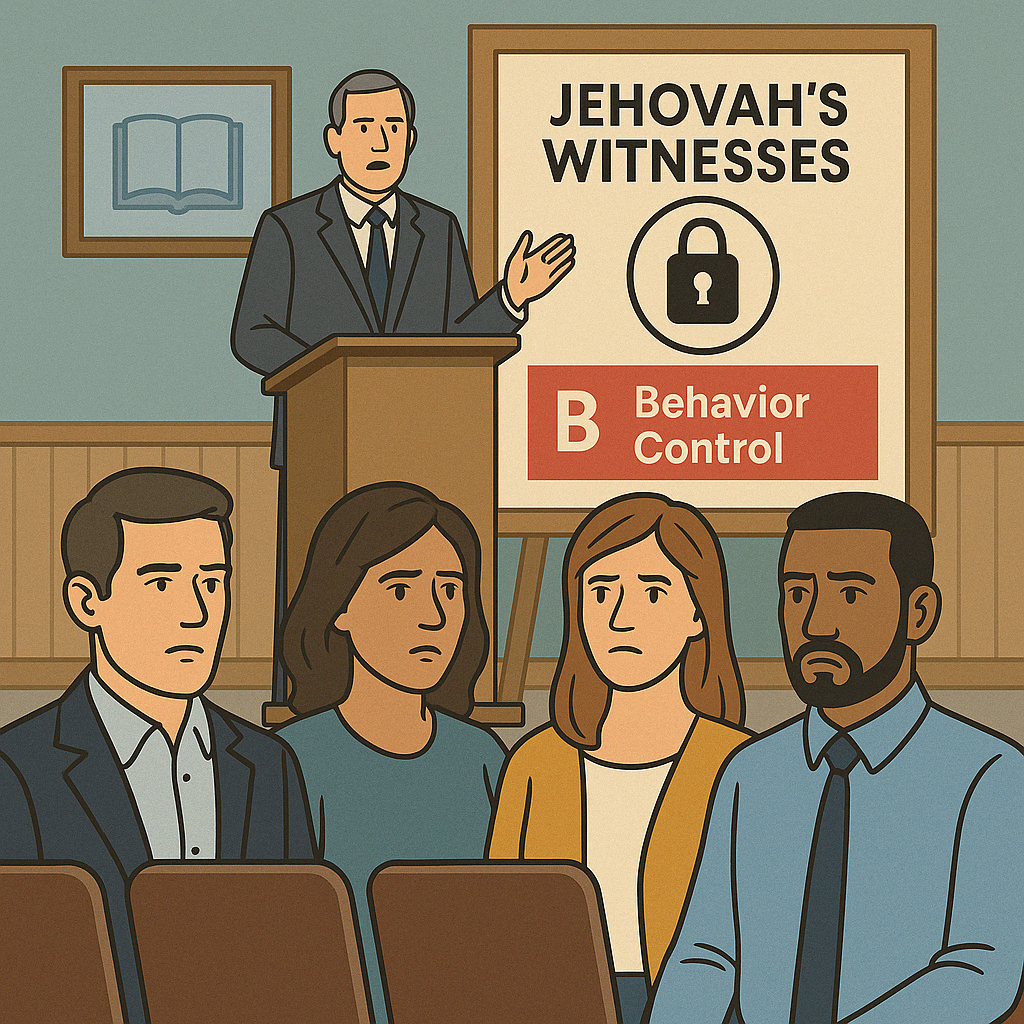As Jehovah’s Witnesses, we’re encouraged to be discerning and to test all things (1 Thess. 5:21). In recent years, some have become more aware of how powerful influence can shape people’s thinking, especially through what psychologists call undue influence. One framework used to understand this is called the BITE model, which outlines how groups may use Behavior, Information, Thought, and Emotional control to shape members’ lives. While we know that Jehovah’s organization is built on love and truth, it can be helpful to examine how influence works so we’re not misled by those claiming to offer “spiritual truth” while subtly controlling people in unhealthy ways (Matt. 7:15). Being aware of such patterns can help us remain spiritually alert and loyal to Jehovah rather than to any human authority.

It was developed by Steven Hassan, a former member of the Unification Church (Moonies) and now a well-known cult expert. The BITE model outlines the ways that destructive cults and authoritarian groups control individuals.
BITE stands for:
- Behavior Control
- Information Control
- Thought Control
- Emotional Control
Each of these four categories has specific techniques used to manipulate and control members. Here’s a quick overview:

🔒 Behavior Control
- Regulate individual’s physical reality (where, how, and with whom they live or associate)
- Dictate diet, clothing, grooming
- Control of sleep and major life decisions (marriage, education, employment)
- Financial exploitation or dependence
- Permission needed for major actions
🧍♂️ Behavior Control (Jehovah Witness Organizational Examples)
- Regulation of associations – Witnesses are told to limit association with “worldly people” and to avoid former members, especially disfellowshipped ones, even if they are family (1 Cor. 15:33 is often cited).
- Time control – Daily schedules are heavily encouraged to include meeting attendance, family worship, personal study, field service, and spiritual routines—leaving little time for secular pursuits.
- Dress and grooming standards – There are specific guidelines on modesty and grooming, including restrictions on beards in many congregations and expectations for modest attire even outside of meetings.
- Dating and marriage restrictions – Members are strongly discouraged or forbidden from dating or marrying non-JWs. Marrying “only in the Lord” is emphasized (1 Cor. 7:39).
- Discouragement of higher education – While not officially banned, higher education is routinely discouraged in talks, literature, and videos as spiritually dangerous or pride-inducing.
- Control over living arrangements and major decisions – Decisions like choosing a career, where to live, or even medical choices (like refusal of blood transfusions) are directed by the organization’s teachings.
- Field service tracking – Members are required to report their preaching hours monthly, with elders reviewing the time submitted as a measure of spiritual health.
As one of Jehovah’s people, I’ve always wanted to do what’s right and stay close to the congregation. But over time, I’ve started noticing how much of our daily life is directed—not just encouraged—by the organization: who we can associate with, whether we can pursue education, how we dress, even how much time we spend in the ministry. These aren’t just spiritual suggestions; they’re often treated as requirements tied to our standing with Jehovah.
When I think about it honestly, it feels less like personal faith and more like controlled behavior. I don’t bring this up to cause division or disrespect, but because I truly believe Jehovah values sincerity, not just compliance. If we are only following rules out of fear of men or losing family, is that really the kind of worship Jehovah desires? (John 4:24) Maybe it’s time we honestly ask whether some of this “guidance” is actually keeping us from developing a genuine relationship with Him.

🧠 Information Control
- Deception (withholding or distorting information)
- Discouraging access to non-approved media or sources
- Spying on other members (reporting infractions)
- Use of propaganda or loaded language
🧠 Information Control (Jehovah Witness Organization Examples)
- Discouragement of outside sources – Witnesses are repeatedly warned against reading apostate material, independent Bible interpretations, or even religious literature from other Christian groups. The phrase “stay close to Jehovah’s organization” is used to encourage reliance solely on Watchtower publications.
- Condemning critical thinking – Critical analysis of the organization’s history, teachings, or leadership is often labeled as “independent thinking,” which is equated with spiritual pride or rebellion.
- Selective truth-telling – The organization has revised or omitted parts of its own history (e.g., failed Armageddon predictions in 1914, 1925, 1975) in official publications, limiting what members learn about past mistakes.
- Rewriting and controlling internal media – The organization has their own Bible translation (New World Translation), their own video production studio, and restrict members to Watchtower-approved content such as JW.org, JW Broadcasting, and the JW Library app.
- Shunning and reporting – Members are encouraged to report fellow Witnesses who express doubts or read “dangerous” material, reinforcing a culture of surveillance and fear.
- Information overload and repetition – The same core messages and phrases are repeated constantly through meetings, conventions, and publications to reinforce loyalty to the organization.
Lately, I’ve been thinking about how we, as Jehovah’s people, are taught to be cautious about what we read and watch. That’s understandable—there’s a lot of harmful content out there. But it also seems like we’re told to avoid anything that doesn’t come directly from the organization, even if it’s factual or presented respectfully. Whether it’s historical context, alternate Bible research, or honest questions about our teachings, we’re warned that such things are spiritually dangerous, even apostate.
We’re also reminded constantly to stick to “Jehovah’s channel” and avoid “independent thinking.” But when I read the Bible, I see faithful servants like the Bereans (Acts 17:11) who were praised for double-checking what they were taught. If we truly have the truth, shouldn’t it stand up to honest investigation?
It makes me wonder—are we really being protected, or are we being shielded from information that might challenge the organization’s control? I don’t ask this to cause trouble, but because I want my faith to be based on truth, not just repetition. Jehovah is the God of truth (Ps. 31:5)—He doesn’t need His people to be afraid of facts.

💭 Thought Control
- Use of loaded language and clichés to stop critical thinking
- Rejecting rational analysis, critical thinking, or doubt
- Teaching a “black-and-white” or “us vs. them” mentality
- Thought-stopping techniques (chanting, prayer, repetitive mantras)
💭 Thought Control (Jehovah Witness Organization Examples)
- Discouraging “independent thinking” – Within the brotherhood, independent thinking is regularly warned against. It’s described as spiritually dangerous, prideful, and something Satan encourages to draw us away from Jehovah’s arrangement.
- Use of loaded language – Phrases like “stay in the truth,” “wait on Jehovah,” “be obedient to the faithful and discreet slave,” and “avoid apostate thinking” are used to guide thoughts and discourage questioning. These expressions carry emotional and spiritual weight that frame loyalty as righteousness and doubt as disloyalty.
- “Us vs. Them” mentality – The world outside is viewed as being under Satan’s control, while Jehovah’s people are seen as the only true worshippers. This creates a mental divide that discourages empathy toward outsiders or curiosity about other viewpoints.
- Reframing doubts as spiritual weakness – When someone has questions about teachings or direction from the Governing Body, it’s often framed as a personal failing, a lack of faith, or even a test from Jehovah, rather than a valid concern.
- Thought-stopping techniques – When negative feelings or doubts arise, members are encouraged to pray, sing Kingdom songs, read the Bible or Watchtower literature, or immediately shift focus to spiritual activities like preparing for meetings or going out in service.
- Doctrine as absolute truth – The idea that “Jehovah is using the faithful and discreet slave to provide spiritual food at the proper time” makes members equate organizational teachings with divine truth—even when doctrines have changed over time.
Something that’s been on my heart lately is how much emphasis is placed on obedience within the organization—not just to Jehovah, but specifically to the Governing Body. We’re told not to question their direction, even if it doesn’t seem to align with our own understanding or conscience. In fact, “independent thinking” is often described as a threat, something Satan uses to mislead us. But doesn’t Jehovah give each of us a conscience and a thinking mind for a reason?
We’re also taught certain phrases that close off deeper thought—like “wait on Jehovah” or “Jehovah’s organization is always right in the end.” These sayings can stop us from asking necessary, even loving questions. But when we’re discouraged from thinking critically or prayerfully examining teachings, is that really promoting strong faith—or just unquestioning loyalty?
I love Jehovah and want to serve Him with my whole mind and heart. But part of that means being honest with myself: Am I following Him, or just doing what I’m told out of fear or habit? (Matt. 15:8-9) I don’t believe Jehovah is afraid of our questions. In fact, I think He welcomes them—because real truth doesn’t break under pressure.
😨 Emotional Control
- Promoting extreme loyalty and dependence on the group
- Instill irrational fears (e.g., fear of the outside world, losing salvation, or punishment)
- Guilt-tripping (you are selfish if you question or leave)
- Shunning or public confession to control and shame
😨 Emotional Control (Jehovah Witness Organization Examples)
- Instilling fear of “the world” – Witnesses are often reminded that the world is under Satan’s control, and that bad association, higher education, or even thinking critically can lead to spiritual ruin or disfellowshipping. This creates a constant undercurrent of fear about straying from “Jehovah’s organization.”
- Guilt for not doing enough – Regular reminders to pioneer, comment at meetings, conduct Bible studies, or increase time in the ministry can cause deep guilt in those who are struggling, sick, busy, or mentally exhausted. Doing less is often viewed as being “spiritually weak” or “lukewarm.”
- Shunning and emotional punishment – Those who are disfellowshipped or who choose to leave “the truth” are often completely cut off, even by close family members. The emotional weight of losing every social and familial tie is a powerful deterrent to questioning or leaving.
- Love bombing and conditional acceptance – When someone is newly interested or returns after being away, they are shown overwhelming warmth and attention. But this love is conditional—based on staying active and obedient within the organization.
- Fear of Armageddon – Vivid descriptions of impending destruction are often used in talks, videos, and literature to warn of what awaits those who leave Jehovah’s people. Even children are taught that survival depends on staying loyal to the organization.
- Framing suffering as a test from Jehovah – When emotional, financial, or mental hardships happen, they’re often presented as tests of faith. Rather than explore practical solutions or emotional healing, members are encouraged to endure quietly and trust that Jehovah is refining them.
One of the things I’ve been praying about lately is how much emotion plays a role in our relationship with the organization. We’re constantly reminded that if we ever leave, we’ll lose Jehovah’s favor—and often, our family too. The fear of being disfellowshipped or shunned keeps many of us from ever expressing doubt, even when our hearts are troubled. That kind of fear can be paralyzing. It doesn’t feel like the freedom or peace that Jesus promised his followers (Matt. 11:28-30).
At the same time, there’s a heavy sense of guilt when we don’t “do enough.” Whether it’s meeting attendance, field service hours, or making comments, there’s this underlying pressure that if we’re not constantly “reaching out,” we’re spiritually weak or disappointing Jehovah. And when someone is reinstated, they’re often only fully accepted again once they prove themselves through performance, not grace.
But is that really how Jehovah treats His children? Is His love truly that conditional? The more I study the Bible for myself, the more I see that Jehovah draws close to the brokenhearted—not shames them into submission (Ps. 34:18). Fear might control behavior, but it doesn’t build love. And if love isn’t the foundation of our faith, what are we really building on? (1 John 4:18)
You know, as Jehovah’s people, we’re taught to test everything and make sure our faith is based on truth (1 Thess. 5:21). Lately, I’ve been reflecting on how certain groups—especially high-control ones—can exert influence in ways that aren’t always obvious. There’s something called the BITE model that breaks this down into four areas: Behavior, Information, Thought, and Emotional control. It’s used to identify when a group might be stepping beyond loving guidance and into something more manipulative.
When I honestly compared our own practices as Witnesses to that model, it made me pause. The organization regulates our behavior pretty closely—who we associate with, how we dress, what kind of work or education we pursue. It controls information by warning us away from anything that isn’t from “Jehovah’s organization.” It shapes how we think, by discouraging “independent thinking” and teaching us that questioning is a sign of spiritual weakness. And it influences our emotions through fear—fear of disfellowshipping, fear of Armageddon, and fear of losing our family if we step outside the line.
I’m not saying this to tear down anyone’s faith—far from it. I love Jehovah and want to do what’s right. But I also think Jehovah gave us minds and hearts to reason with, not to silence. If any group—religious or otherwise—uses fear, guilt, and control to keep people in line, it’s worth asking: Is this how Jehovah really works? There are plenty of examples that make me feel like this is a cult. Where do I go? I’m told that I’m leaving Jehovah if I leave the organization and stop going to meetings. But, if it’s a religion of men, am I really leaving Jehovah? So many others have stopped going to the meetings, but are they really out of sync with Jehovah? Maybe not. Maybe, we’re told these things because of the control that the governing body wants. I think I can still serve Jehovah.
